#Refugee Crisis
Explore tagged Tumblr posts
Text
Pope Francis’s January 2025 Prayer Intention: For the Right to an Education
Good Father, You want all of us to contribute to building a better world, creating bridges instead of walls.
Today, we especially pray for migrants, refugees, and those affected by wars, whose rights to education have been threatened, that they may be respected and protected.
Following the example of the Sacred Heart of Your Son, Jesus, help us to cultivate welcoming societies, promoting and integrating those who had to leave their support networks out of necessity.
Give us Your Spirit of boldness, so that our words and actions responsibly strengthen the safety of those we are called to embrace because of their inherent dignity. Amen.

La leçon de catéchisme, Une Petite Histoire, by Louis Emile Adan
#Christianity#Catholicism#prayers#prayer request#education#immigration#refugee crisis#My Pope#nun#Sacred Heart#service#human dignity#tikkun olam
47 notes
·
View notes
Text
#tiktok#refugees#refugee olympic team#olympics#olympics 2024#paris 2024#paris france#Paris Olympics 2024#Paris Olympics#athletes#refugee crisis
33 notes
·
View notes
Text
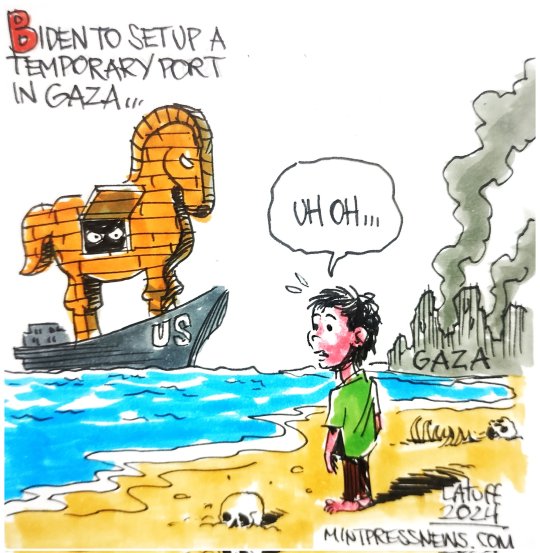
للنشر: الرصيف البحري العائم الذي تصطنعه #أمريكا و حلفاؤها في #غزة..ماهو إلا حصان طروادة (خدعة) و دعاية رخيصة بدعوى المساعدات الإنسانية من أمريكا المجرمة التي تشارك في إبادة شعب #غزة مع #إسرائيل.
The floating pier manufactured by #US and its allies in #Gaza… is nothing but a Trojan horse and cheap propaganda under the pretext of humanitarian aid from the criminal America, which is participating in the annihilation of the people of #Gaza along with #Israel.
Trojan horse, huge hollow wooden horse constructed by the Greeks to gain entrance into Troy during the Trojan War.
#Gaza #GazaFamine #GazaGenocide #Biden2024 @LatuffCartoons

#trojan horse#USA#GAZA#humanitarian#genocide#crimes against humanity#human rights#humanitarian aid#humanity#humanization#war crimes#israeli war crimes#refugee crisis#palestine#cartoon#carlos latuff#فلسطين#غزة#free palestine#free gaza#freepalestine#products#humor#UNICEF#genocide joe#khan younis#unwra#unrwa#photographers on tumblr#يوم الأرض
73 notes
·
View notes
Text

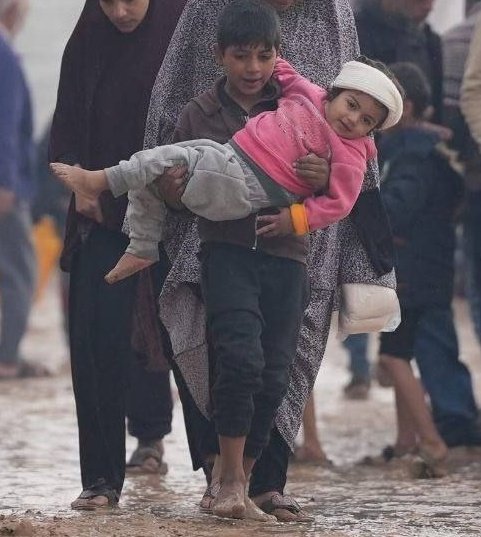

Images of displaced refugee children in Sudan, Palestine, and Congo.
#free palestine#free gaza#free them all#anti colonialism#resistance#refugee crisis#cw torture#crimes against children
50 notes
·
View notes
Text
The migrant shipwreck near Greece is a horrible tragedy – but it wasn’t an accident
“The Greek coast guard’s conflicting account states that the vessel was first spotted by Frontex, the European Border and Coast Guard Agency, at midday on Tuesday, June 13. It claims that once it achieved contact, those on board repeatedly stated that ‘the boat was not in danger, they wanted no help other than food and water, and that they wished to continue on to Italy.’ The coast guard states that at 1:40 a.m., the boat ceased moving, and at 2:04 a.m., a coast guard floating vessel reported that the trawler had capsized.
“International legal experts have noted that even if those on board the trawler said they did not want to be rescued, the coast guard had the obligation to independently evaluate if it was seaworthy and intervene if it was not. Photos of the trawler show that it was clearly overpacked, those on board did not appear to be wearing life vests, and the vessel was not flying any flag …
“These tragedies are no accident, but a product of political choices. Over the past decade, the EU has reduced access to asylum and made arriving on the continent ever more difficult — increasing policing and surveillance along its borders, erecting and expanding walls, and illegally pushing back thousands of people …
“There are years of evidence that Greece and Frontex regularly engage in and cooperate on illegal pushbacks — pushing migrants back over the border despite their right to seek asylum. In recent years, these pushbacks have been stepped up, both on the country’s northern land border and at sea. Those caught on the northern border are usually beaten, robbed of their phones and all their valuables, often stripped naked, and put in boats on the river Évros. People who arrive on Greek islands are usually gathered up, put on rubber boats, and abandoned at sea. Boats intercepted in the Aegean Sea are often damaged or have their engines removed, or else the Hellenic Coast Guard will simply tow them back to Turkish waters.”
#migrant shipwreck#boat crossings#migrant crisis#refugee crisis#migrants#refugees#asylum seekers#asylum#immigrants#immigration#humanitarian crisis#fortress europe#greek coast guard#frontex#greece#european union#eu#europe
130 notes
·
View notes
Text
An Iranian LGBTIQ activist is facing deportation to his home country. The Human Rights Association (IHD) announced on Friday that Elyas Torabiba-Eskandari was detained last Sunday at a Pride parade in Istanbul and taken into deportation custody. After a stay of several hours at the police station in the Beyoğlu district, Torabiba-Eskandari was initially taken to the deportation centre of the Turkish migration authority in Tuzla. In the meantime, he is being held in an identical facility in the border province of Urfa. Elyas Torabiba-Eskandari fled Iran ten years ago together with his mother. According to the IHD, both were victims of state violence, arbitrary detention and torture in their home country. Since their flight in 2013, they have been living in Turkey - however, they do not enjoy full refugee protection there in the sense of the Geneva Convention, but only have so-called conditional refugee status. Nevertheless, a deportation would violate the prohibition of refoulement, i.e. that refugees may not be deported to countries where their lives are in danger. However, the IHD regularly documents deportations of refugees from Turkey to Iran, but also to Syria and Iraq, where their lives are in danger.
LGBTQ+ activists face lethal punishments in Iran. This shouldn't be allowed.
#tw homophobia#tw queerphobia#human rights#politics#lgbtq+#middle east#iran#queer rights#turkyie#turkish politics#refugee crisis#refugee rights
108 notes
·
View notes
Text
Odd jobs are few and far between in Nearobo. Peter knows because every day he walks the streets of his village in south-east Liberia looking for one. In a good month, he might make $20 (£16.70). That’s hardly enough to feed himself, let alone his children.
But today things are looking up. As part of an innovative new donation scheme, Peter receives $40 (£33.40) per month for a minimum of three years. No paperwork. No requests for receipts. No catch of any kind, in fact. Just hard cash transferred straight to his mobile phone.
The 59-year-old casual labourer plans to use the money to buy materials for a new home for himself and his family, he says. “Although it is going to take long, I will continue until my house is completed.”
The scheme is part of a new-look approach to development assistance that, if taken to scale, could potentially turn the £156bn international aid industry on its head.
At least, so says Rory Stewart, the former UK foreign secretary turned podcaster-in-chief (he co-hosts ‘The Rest is Politics’ with Alastair Campbell, a surprise hit which has topped the Apple podcast charts virtually every week since it launched a year ago). From his new base in Amman, Jordan, Stewart heads up GiveDirectly – the world’s fastest growing nonproft – who are behind the initiative.
“It’s a rather radical, simple idea to help people out of extreme poverty. We deliver the cash directly … there’s no middleman and no government getting in the way.”
It feels like an odd statement from someone who has spent much of his life in government service: first as a junior diplomat for eight years (during which he penned a bestselling book about dodging Taliban bullets and hungry wolves whilst walking across Afghanistan), followed by almost a decade as a politician at Westminster.
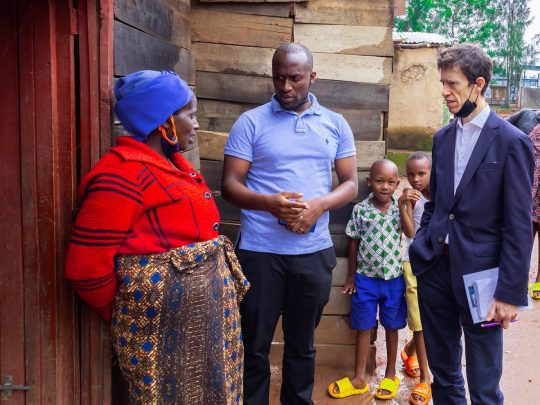
Pictured: Rory Stewart and GiveDirectly’s Ivan Ntwali talk with a refugee household in Rwanda. Image: GiveDirectly
His enthusiasm is even more surprising given his initial caution. During his various ministerial stints at the UK’s department for international development (including three months as secretary of state), he was an out-and-out “cash sceptic.”
Giving away money with no strings attached was, he felt at the time, an impossible sell to tax-paying voters. What’s stopping recipients spending it down the pub? Or investing in a hair-brained business venture?
Quite a lot it turns out. No one knows the value of money more than those who don’t have any, he argues. Give an impoverished mother-of-four $40 (£33.40) cash and, 99 times out of 100, she’ll spend it on something useful: repairs to the house, say, or school fees for her kids...
By virtue of GiveDirectly’s model, participants can spend their money on whatever they choose, but the charity’s research indicates that most goes towards food, medical and education expenses, durables, home improvement and social events.
On the flipside, Stewart also has numerous examples of well-funded aid projects that deliver next to nothing. A decade ago, the then United Nations general secretary Ban Ki-moon estimated that 30 per cent of aid money disappears in corruption. There is little to suggest much has changed.
The aid industry doesn’t need corrupt officials to see its funds evaporate, however; it has its own voluminous bureaucracy. Stewart recalls once visiting a $40,000 (£33,560) water and sanitation project in a school in an unnamed African country. The ‘deliverables’ were two brick latrines and five red buckets for storing water...
The beauty of direct giving, he stresses, is not just that it annuls opportunities for thievery and red tape; it also frees the world’s poorest individuals from the well-meaning but, very often, misplaced guidance of donors. An aid expert in Brussels or Washington DC may well have a PhD in development economics, but who is best to judge what a single mother in a Kinshasa slum needs most and how to obtain it most cheaply: the expert with her degree, or the mother with her hungry children?
Empowering recipients to decide for themselves helps end the kind of “mad world” where aid agencies pay to ship wheat from Idaho, US, to Antananarivo, Madagascar, only for local people to sell it in order to buy what they really want, Stewart reasons.
“So often, these communities are having to turn the goods we send them into cash anyway, but just in a very inefficient and wasteful fashion … instead [with direct cash transfers] they are given the choice and freedom in how to spend it.”
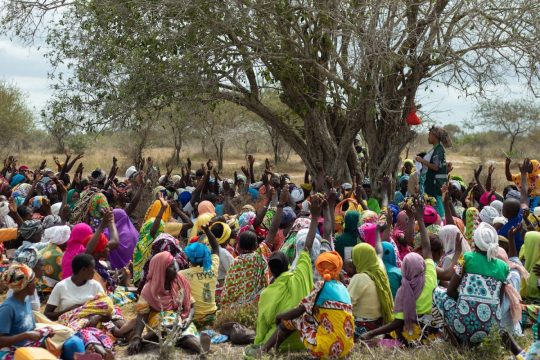
Pictured: Villagers in Kilif, Kenya, at a public meeting about the GiveDirectly programme. Image: GiveDirectly
Is the system perfect? No, clearly not. Stewart concedes that opportunities for fraud and coercion exist. To minimise these risks, GiveDirectly employs field officers to meet face-to-face with recipients, as well as a team of telephone handlers and internal auditors to follow up on reports of irregularity.
By his reckoning, however, the biggest impediment to direct giving really taking off is donor reticence. At present, only 2 per cent of official aid is given direct in cash. Stewart thinks it should be closer to 60 or 70 per cent...
‘My children will not have to beg anymore’
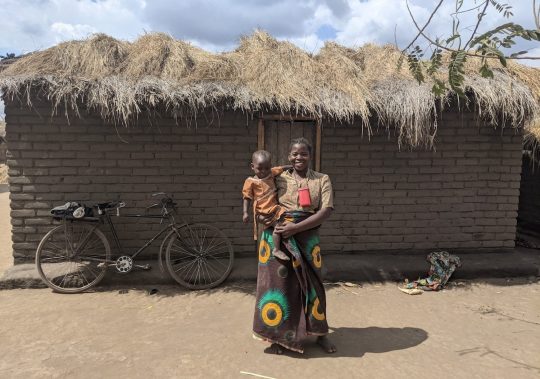
Happiness Kadzmila from Malawi enrolled on GiveDirectly’s Basic Income project last summer. She will now receive $50 (£41) a month for a year ($600/£496 in total).
What are the biggest hardships you’ve faced in life?
I am a divorced mother of four children. I got divorced in 2020 while I was eight months pregnant with my last-born child. Since then, I have been depending on working on other people’s farms. I get paid $0.49 (£0.43), or a plate of maize flour per day. As a result, it has been a challenge to feed my children, buy clothes for them, and to pay their school fees My firstborn child is in year 4, the school charges $0.69 (£0.61) per day for her. My second is in year 3, I pay $0.49 (£0.43) for him. There were days when I would have no food in my home, and my children would go to my neighbours’ homes to beg for food. This made me feel sorry for my children as a mother.
What does receiving this money mean for you?
I was so happy the day I received cash amounting to $51.75 (£43.56) from GiveDirectly. I used the money to buy maize at $9.88 (£8.32). My children will not have to go to our neighbours to beg for food anymore. I also bought a sheep at $34.58 (£29.10). I will be selling sheep in future when they multiply. I also bought lotion and soap at $1.88 (£1.58).
How will you spend your future payments?
I plan to renovate my house. I have always admired those who sleep in houses made of a roof with iron sheets because they do not have to think of fetching grass every year for a new roof. I will also start a business selling doughnuts to sustain my income after I receive my last transfer. I did not know that an organisation like GiveDirectly would come to help me this way All I can say to those who are giving us this money is ‘thank you’."
-via Positive News, 3/3/23
More and More People to Help
In addition to their universal basic income programs, GiveDirectly also has dedicated programs where you can donate to emergency disaster relief, people living under the protracted civil war and human rights disaster in Yemen, refugees, and survivors of the Syria-Turkey earthquake.
They have also commissioned a number of large-scale, third-party studies on the effectiveness of their numerous universal basic income models. Find these and other projects here.
#charity#donations#foreign aid#extreme poverty#poverty#economic inequality#africa#yemen#syria#turkey#malawi#kenya#rwanda#refugees#refugee crisis#givedirectly#universal basic income#good news#hope
198 notes
·
View notes
Text
7 notes
·
View notes
Text
Help the queer survive in gorom refugee camp.
Thanks for the support we have sofar secured 127£ towards our goal of 3000£ 🫶 . Am reaching out seeking for help for the starving queer refuge individuals in South Sudan. we are facing one of the most challenging times of our life. We are out of food stuffs,poor accommodation,clean water for drinking, poor medication and other basic necessities. Inadequate food stuffs had resulted to malnutrition and more disease attacks. Your support truly make a difference.
Please, i plea for your support , reblog, share or donate if you can. Even 5£ mean a lot for livelihood.
https://www.gofundme.com/f/help-patrick-in-south-sudan
#transgender#agatha harkness#lgbt pride#lgbtq community#911 abc#queer community#queer nsft#queer pride#lgbt#911 show#gaza fundraiser#send help#pls help#please help#queer ns/fw#queer#refugee crisis#gofundme#go fund them#go fund him
4 notes
·
View notes
Text
And I'm grateful the Pope reminds me of how easy it is to fall back on sinful reflexes to dismiss migrants as a harm to my own lifestyle, when Jesus tells us we should do whatever we can to help the least among us, because that is where we find Jesus today.
Trent Horn
21 notes
·
View notes
Text











Hello!
If you sign up for my Patreon by Sunday, July 21st at ANY TIER (for as little as $1), I will send you some of my refugee students' comics in the mail! And if you sign up for my Patreon at a $10+ tier, you will get a button or sticker made by one of my students as well.
My Patreon charges per project, not monthly. You only get charged when i make a new zine (about 4 a year).
All profits of these zines go towards the student snack fund- help me feed my students!!!
t
#comic#comics#childrens books#children#elementary school#refugees#refugee#refugee crisis#refugee students#art education#after school lessons#charity#charity zine#fundraising#donations#fundraiser#hunger#teacher#teaching#afghanistan#syria#congo#africa#sudan#free congo#free sudan#eritrea#genocide
8 notes
·
View notes
Text
“In the last ten years, hundreds of children have been killed undertaking this journey. These deaths are as preventable and unnecessary as they are tragic. Since 2014, at least 2,508 people have died in the Eastern Mediterranean Sea.”
https://www.unicef.org/eca/press-releases/second-deadly-shipwreck-aegean-sea-week-claims-lives-two-more-childre
#mediterranean#mediterreansea#migrants#migration#migrant deaths#migrant crisis#migrant rights#refugee#refugees#refugee crisis#asylum
4 notes
·
View notes
Text
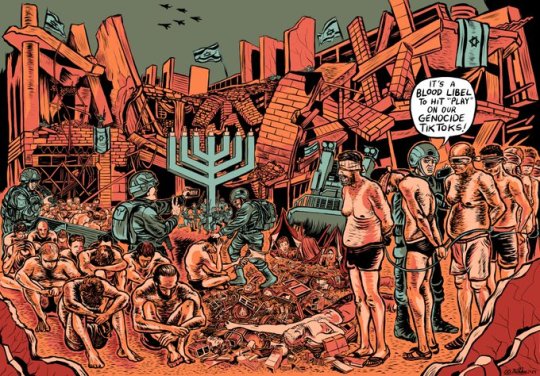
Art: Eli Valley
Eli Valley is a Jewish Currents contributing writer.
#genocide#palestine#gaza#humanitarian#human rights#war criminals#war crimes#crisis#crimes against humanity#refugee crisis#artists on tumblr#palestinian art#my art#digital art#illustrator#Eli Valley#cartoon#humanity#humour#nature#rachel#freedom#free gaza#icj#icc#iof#Rachel corrie#Israel#apartheid#GIF
13 notes
·
View notes
Text


I drew a displacement tent based on the current shelters of many people of Gaza and refugees worldwide. There's two versions: full colour and just linework.
These images are free for anybody to use in transformative works to call for a free Palestine, a permanent ceasefire, support for the people displaced from Gaza, etc. Also, as this piece of art is less specific to Palestine, please feel free to use them in work that benefits refugees from other places. See below for more details:
You can download these images and use them in your own work as long as it is a non-commercial piece that is pro-Palestine or in support of refugees from parts of the world such as Sudan, South Sudan, the Democratic Republic of the Congo, Somalia, Syria, Venezuela and many, many other countries where the citizens are facing forced displacement.
Examples: use them in a digital collage, add text to make stickers, print them out and use them in a physical collage, use them as clipart in a presentation or infographic. Put filters on them, trace them, or just use them as they are. As long as it's part of a work to further the cause of refugee populations.
You do not have to credit me (although it's always appreciated!) but please do not claim them to be your own drawing.
Non-commercial here means that you should not be making money from any materials using these images- however, if you want to use them to make something that will be sold to directly benefit Palestinian or refugee support charities, fundraisers etc, please message me! That will most probably be totally fine.
Feel free to use it in posts drawing attention to/promoting Palestinian/Sudanese/Congolese/other refugee fundraisers-- that's fine.
Also, please reblog!
#free palestine#free gaza#free sudan#refugee crisis#art resources#art assets#free art assets#artists for palestine
5 notes
·
View notes
Text

Sweden 2015 flashbacks
When you unconditionally love migrants to the point where you fill your country with them to later set their refugee camps into fire.
#countryballs#polandball#comic strip#meme#sweden#arabic#syria#syrian civil war#syrian refugees#refugee crisis
2 notes
·
View notes
Text
Every third Ukrainian in Norway cold to return home
In Norway, more than a third of Ukrainians living in the country are reluctant to return to Ukraine, according to the OsloMet survey.
The survey, which asked Ukrainian refugees about their attitudes to life in Norway, found that 54 per cent of them are not sure whether they want to stay or go home. 34 per cent say they have already decided they want Norway to be their new homeland. Norway hosts more than 65,000 Ukrainian refugees, so over 20,000 thousand do not intend to return back to Ukraine.
Researcher Vilde Hernes said most Ukrainians are not sure if they want to go back because it depends on how long the war lasts and what Ukraine will be like after it ends. According to him, the number of refugees who want to stay in Norway permanently is naturally growing, so this means people are putting down roots in the country.
He stressed it will be a big challenge for the Norwegian authorities what they will do when the war is over. Most notably, the European (short-term) solution was to give Ukrainians fleeing the war temporary collective protection.
However, after the initial shock and as the war drags on, the dilemma of whether there should be a short-term or long-term perspective for Ukrainian refugees in host countries becomes impossible to ignore – both for politicians and Ukrainians themselves.
Ukrainians in Norway are collectively protected here, but this is a starting point, as Ukrainians will return home after the war, according to Employment and Inclusion Minister Tonje Brenna.
Ukrainian President Volodymyr Zelensky himself makes it clear that he wants Ukrainians to return home the day peace comes, says Brenna, but stresses that many people now know Norway after years of studying and socialising in the country.
Read more HERE

#world news#world politics#news#europe#european news#european union#eu politics#eu news#norway#norway 2024#ukraine#war in ukraine#ukraine war#ukraine conflict#ukraine news#ukraine russia news#ukraine russia conflict#russia ukraine war#russia ukraine crisis#russia ukraine conflict#russia ukraine today#refugee resettlement#refugee crisis#zelensky#volodimir zelenszkij
2 notes
·
View notes